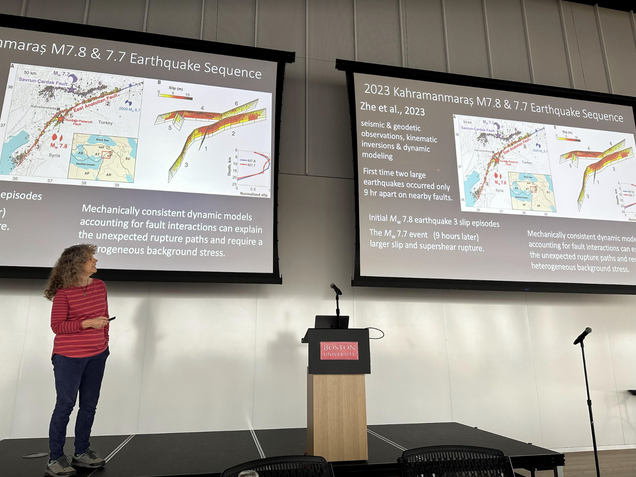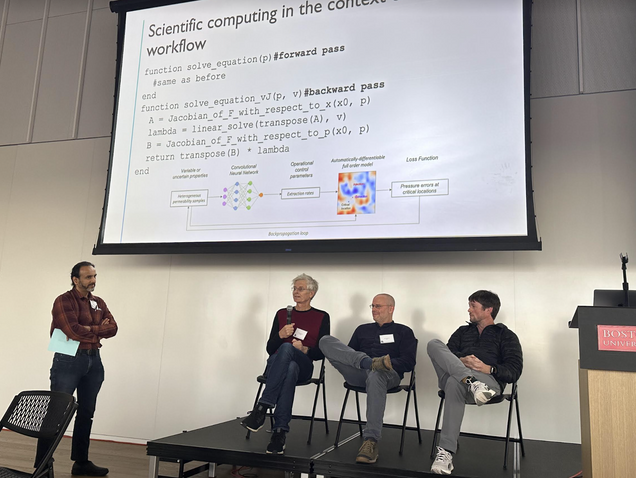
On Friday, November 10, 2023, CISE organized a first of its kind workshop, drawing in a diverse gathering of experts hailing from all over the US and Italy to explore the intersection of artificial intelligence and earthquake sciences.
The workshop was presented alongside an AI Challenge, where participants were challenged to predict earthquake timing and surface displacement using data provided by Penn State University in collaboration with Los Alamos National Laboratory (LANL) in New Mexico.
The workshop was an exploration of the intersection between advanced machine learning and artificial intelligence techniques and seismology. Chris Johnson, Plenary Speaker (LANL) shared his research on using machine learning to probe seismogenic faults. A key aim of his research is to figure out how the Earth’s outer layer (crust) changes shape and moves. Johnson has set up many on-site studies to gather earthquake-related data and understand different types of signals that are often recorded but not understood. He has been heavily involved with handling large sets of data and using machine learning to solve problems in the field of Earth science.
The morning session featured insightful talks on lab-scale earthquake prediction by Chris Marone, observational earthquake science by Rachel Abercrombie, and deep learning of seismograms by Mostafa Mousavi, followed by a dynamic discussion. The afternoon session explored data-driven discovery in geosciences and integrating ML into geoscience. Peter Gerstoft talked about anomaly detection in acoustic sensing systems, Ben Holtzman highlighted learning based modeling of rocks augmented with acoustic information, and Daniel O’Malley informed the audience on connecting numerical models and machine learning models. Afternoon highlights included talks by AI Challenge winners as well as talks by Srisharan Shreedharan on earthquake forecasting and by Laura Laurenti on applying deep learning to understand fault zone variations. The workshop provided a rich overview of cutting-edge advancements, fostering collaboration and knowledge exchange among participants.
The winners of the AI Challenge were:
1st Place: Ian McBrearty (Stanford University), Artemii Novoselov (Stanford University), Xing Tan (Stanford University), and Yifan Yu (Stanford University)
2nd Place: Seyifunmi Adeboboye (Georgia Tech) and Joses Omojola (University of Arizona)
3rd Place: Efe Sencan (Boston University)

Ayşe Coşkun, Christopher Johnson, Paul Johnson (LANL), and Eren Kurshan (Princeton) co-organized the event. Their shared passion for cutting-edge technology and collaborative spirit brought them together to organize an event that combined their expertise, creating a unique intersection of artificial intelligence and earthquake sciences. Several CISE faculty members, Yannis Paschalidis, Brian Kulis, and Prakash Ishwar, facilitated discussions at the event to explore open problems in earthquake sciences with an AI and data science perspective.
“For years, scientists have been deciphering the physics of earthquakes and only fairly recently have started to apply machine learning methods. AI has changed many research fields and enabled advancements we couldn’t have imagined,” Coşkun said. “This workshop catalyzed new ideas by bringing together the newest developments in AI with the latest in earthquake sciences. Hopefully, it will lead to new collaborations. CISE was excited to have provided a venue for the research community to explore new scientific problems where AI can continue to make a difference.”
The event was a dynamic convergence of expertise and innovation, exploring the intersection of artificial intelligence and earthquake sciences. The event displayed a shared commitment to advancing technology at the intersection of computing, geophysics, and AI by both attendees and speakers. The winners of the AI Challenge further showed the forward-thinking mantra that this workshop aimed to exhibit.
More information about the event’s speakers as well as the event’s agenda can be found here.
